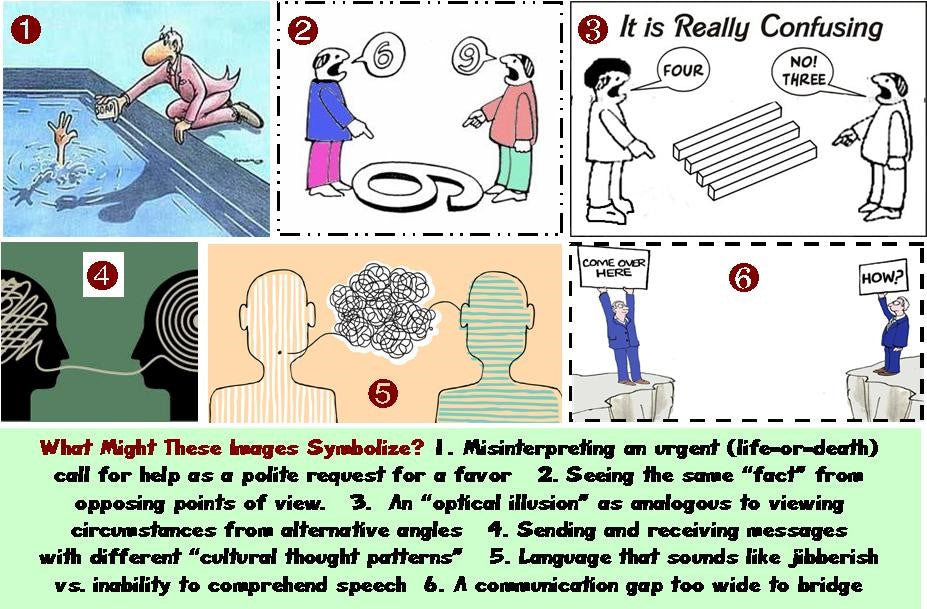Often, attempts at communication fail. People might view situations from different mindsets or perspectives. They could have conflicting ways of expressing themselves or of receiving what others say or write. Their words might not make sense to listeners or readers, or they might be unable to understand someone else. All of these factors can block the exchange of information, ideas, opinions, thoughts, and feelings.
They can lead to situations like these:

Appropriate or Optimal Use of Vocabulary Can Resolve Difficulties
Some communication attempts fail because of mispronunciation or misspelling of words or phrases. In other situations, English speakers/writers might misuse —or listeners/readers might misunderstand—the intent or significance of a vocabulary item whose meaning or usage they don’t get.
For examples + steps to take to solve these problems, you might reread How to Avoid or Correct Vocabulary Mistakes in Pronunciation, Spelling, & Matching Meaning to Context and look up other information and help online!
Other communication failures stem from additional vocabulary features: their grammatical restrictions, their inclusion in pairings or groupings of potentially confusing items, their word parts (roots and affixes), and so on.
- Mistakes in Parts of Speech or Grammar. Using a noun as a verb or an adjective — or another wrong substitution — just looks or sounds clumsy. Similarly, ignoring grammatical rules can produce English that seems undereducated or ridiculous. What’s the point of these jokes about grammar?

- So what can you do to avoid or fix grammar or phrasing mistakes?
- Start out by Recognizing Parts of Speech (Nouns, Verbs, Adjectives). Pay attention to grammatical functions of words, kinds of vocabulary they name, associated words, and typical endings. Use dictionaries to match word meanings and uses to their parts of speech. Choose the right form for each context.
- Think about Word Usage & Phrasing (Following Grammar Patterns & Rules). If you’re using nouns, consider whether they’re uncountable or countable, singular or plural. Make sure that verbs “agree with” their noun or pronoun subjects. If needed, add objects after transitive verbs and prepositions. If it helps, consult learners’ dictionaries that provide grammar notations like [C], [U]. [T], [to VERB, VERBing] in item entries.
- Need grammar review or instruction related to vocabulary? Advanced lessons often include lists of words and phrases that fit into targeted patterns and follow relevant rules. Take another look at Kinds of Common Nouns (Countable vs. Uncountable, Singular vs. Plural).
- Using the Wrong Item of a Pair or Group. Because of their similarities to other (kinds of) items, words and phrases that are compounds, homonyms, homophones, homographs, near-misses, synonyms, or opposites—can confuse English speakers and writers.
- Compounds. The meanings and uses of three kinds of compound vocabulary items—”closed” (“solid”), hyphenated (-), and “open”—depend on how they’re written (where there are punctuation marks or spaces) or pronounced (where pauses or syllable stresses occur). Mistakes in these are not usually critical or irreparably damaging. They just seem like they need correcting.
Even so, learning how compounds function helps build vocabulary skills. Comparing them to phrasing that combines identical or similar words in the same or different order— is revealing. And it’s fun to imagine them.

- So what’s to do to “master” compound vocabulary items?
- As an intro to the spelling and pronunciation of compound nouns, do a brief Textbook Lesson on Compound Words. Check with the relevant Answer Key section.
- When you’re Combining Word Elements into Compound Words & Phrases, most of your creations will be “closed” or “solid” compounds (one word each). Others will be hyphenated (-) adjectives or “open” compounds (phrases with spaces). Put joined components into the contexts of true stories. Complete Vocabulary Charts. Generate vocabulary lists of your own from cues.
- If you really get the idea of three kinds of combined vocabulary, you’ll be able to get the pedagogy of and solve 4 Intermediate Phonics & Spelling Puzzles: Compounds (“Letter Connect,” “Letter Jumble,” “Letter Blocks,” “Rebus Crossword”) Check your answers to see if you got them right. Then meet additional challenges by completing 4 Advanced Phonics & Spelling Puzzles: Compounds. Study the “short lists” of items that follow.
- Finally, congratulate yourself when you Learn & Teach Compound Words & Phrases. Cut out 48 two-sided word-element cards to match and combine into 24 illustrated and defined compounds. Make productive educational use of extensive Reference Lists.
- Homophones & Homographs. Homonyms are words that sound alike but have different meanings. Homophones are homonyms with the same pronunciation but different spellings. Homographs are words that are spelled the same with different definitions: some are pronounced differently.
Here’s are summary charts of these types of potentially confusing vocabulary items: Then comes some of the amusing situations that arise when items in these groups are switched.

- Synonyms & Opposites. When you have enough vocabulary to communicate basic needs and ideas, you’ll begin collecting a variety of ways to express identical, similar, comparable, or contrary If you learn synonyms (words with the same meanings) and opposites (words with contrasting meanings), you’ll be able to make word and phrase choices. You’ll pick better and better ways to say or write what you truly mean. You’ll have the skill to communicate and express yourselves more precisely and effectively.
- So how can you become skilled in use of homonyms, homophones, & homographs; synonyms & opposites?
- Do a spelling text lesson—organized around vowel sounds—on Homophones & Homographs (Words with Two Pronunciations). Check your answers.
- Get the differences among Word Pairings & Groupings—Homophones, Homographs, & Near-Misses. Complete Vocabulary Charts. Choose between or among similar items and correct wrong uses in the context of stories. Continue understanding and using appropriate vocabulary in your own speaking and writing.
- Learn why it’s useful to know Synonyms & Opposites. Try substituting words for one another to see if the meaning or feeling of the language changes. Practice choosing the “best” synonyms and opposites for various contexts.
- To “refine” your vocabulary choices, look into the significance of Word Parts— Endings & Beginnings. Become familiar with the functions and “meanings” word roots and affixes (prefixes and suffixes). Create items of your own to use in real life.
So now you know ways to improve communication by avoiding or correcting vocabulary mistakes in pronunciation, spelling, grammar, and word choice—including items that are easily confused like parts of speech, compounds, homophones, synonyms, and the like. Continue to research these topics. Learn from studying information and doing exercises in the linked portions of materials mentioned above. And to continue your quest for systematic, comprehensive vocabulary acquisition, take a look at some of the products they came from:


Blogs:
- Better English, Better Life
- So Many Ways to Learn English: How to Decide What's Best for You
- Now that I Really Want to Learn Language, How Do I Do It?
- I Know I Need to Learn English. So What Choices Do I Have Now?
Free Work/Life English Samples:
- How to Avoid or Correct Vocabulary Mistakes in Pronunciation, Spelling, & Matching Meaning to Context
- Recognizing Parts of Speech (Nouns, Verbs, Adjectives)
- Word Usage & Phrasing (Following Grammar Patterns & Rules)
- Kinds of Common Nouns (Countable vs.Uncountable, Singular vs. Plural)
- Verb-Meaning Charts, Regular & Irregular Verb-Form Phraseology, & Reference Lists
- Reference Lists of Transitive Verbs with Noun Objects
- Infinitive Phrases in Sentences (with Verbs,Adjectives, & Nouns)
- Infinitives & Gerunds with Similar and Different Meanings
- Textbook Lesson on Compound Words
- Combining Word Elements into Compound Words & Phrases
- Intermediate Phonics &Spelling Puzzles: Compounds
- Advanced Phonics & Spelling Puzzles: Compounds
- Learn & Teach Compound Words & Phrases
- Homophones & Homographs (Words with Two Pronunciations)
- Word Pairings & Groupings—Homophones, Homographs, & Near-Misses
- Synonyms & Opposites
- Word Parts— Endings & Beginnings
About Work/Life English
Work/Life English is an experienced provider of fun, effective English language improvement content that advances the lives of native English and English as a Second Language (ESL) speakers by improving their English competence, comprehension, and communication skills. For more information, visit: www.worklifeenglish.com.

